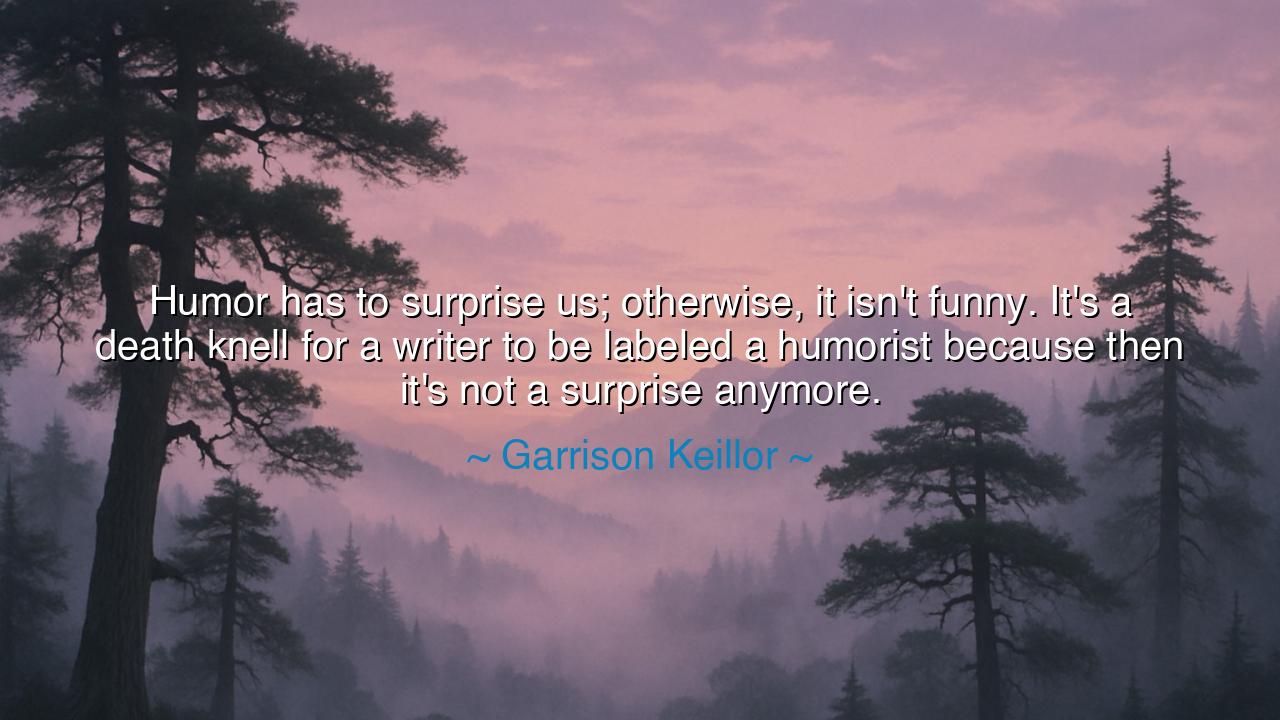
Humor has to surprise us; otherwise, it isn't funny. It's a death
Humor has to surprise us; otherwise, it isn't funny. It's a death knell for a writer to be labeled a humorist because then it's not a surprise anymore.






“Humor has to surprise us; otherwise, it isn’t funny. It’s a death knell for a writer to be labeled a humorist because then it’s not a surprise anymore.” Thus spoke Garrison Keillor, a modern bard of gentle irony and tender laughter, whose voice once wove stories through the air like the tales of old campfires. His words, though about humor, speak to something greater—the essence of creation itself. For what he reveals here is not merely the craft of wit, but the living pulse of all art: that the spark of delight, the gasp of recognition, is born from surprise, from the sudden breaking of expectation. Without that, the spirit of laughter—and indeed, the soul of wonder—dies.
To surprise is to awaken. It is the jolt that stirs the sleeping mind and makes it see the familiar anew. Humor, then, is not mere jest or wordplay—it is revelation. When Keillor says humor “has to surprise us,” he reminds us that true laughter comes not from predictability but from discovery. The joke that can be anticipated is no joke at all, just as the story whose ending we already know cannot move us. The ancients knew this well. Even in the comedies of Aristophanes, laughter was born from inversion—when kings acted as fools, or fools spoke like sages. It was not the laughter of mockery, but of awakening, a glimpse of truth turned upside down.
And yet, Keillor warns of a danger—the death knell that sounds when the artist becomes predictable. “To be labeled a humorist,” he says, “is to lose the element of surprise.” For the moment an audience expects laughter, the laughter itself becomes hollow. When the jester is crowned, his magic fades. This truth is ancient as well. The court jesters of medieval kings, once wild and free in speech, often lost their power once the monarch declared them “official.” The crown turned play into performance, and truth into trick. Laughter, when expected, becomes an echo rather than a song.
The same pattern lives in all who create. The poet who repeats their old rhythm, the philosopher who clings to yesterday’s wisdom, the leader who relies only on past victories—all are victims of their own success. The moment art becomes formula, life drains from it. Surprise is not merely a device; it is the breath of authenticity. The writer, like the trickster or prophet, must remain unpredictable, daring to reveal the unexpected facet of the human heart. For laughter and wisdom are kin—they both break through our defenses and show us what we did not know we knew.
Consider the example of Mark Twain, whose humor lives not in jokes, but in the turning of the ordinary into the profound. His Huckleberry Finn is filled with laughter that surprises because it is rooted in truth. Twain did not seek to be a “humorist”; he sought to be honest, and honesty, when expressed clearly, is often the most shocking thing of all. It is this honesty—this daring to speak plainly about the absurdity of the world—that keeps his words alive long after the jest has faded. The humor remains, not because it was expected, but because it was true.
Thus, Keillor’s lament is not only for humor, but for art itself, for the creative soul that must forever resist being caged. The artist who allows themselves to be labeled—“the humorist,” “the tragedian,” “the realist”—loses the freedom to surprise. They become an echo of their former self, a performer bound to expectation. To create is to risk; to delight is to wander beyond what is safe or known. Only in that place of uncertainty can true laughter, true connection, be born.
And so, dear listener, take this wisdom into your own craft and life. Do not become predictable—not in art, nor in love, nor in the way you face the world. Seek the unexpected in your thoughts, your speech, your days. Be willing to surprise yourself, for surprise is the pulse of growth. Let your humor, your joy, and your vision remain wild, untamed, and alive. The world may try to label you, to make your laughter a commodity, but resist. Remain human—ever curious, ever spontaneous.
For as Garrison Keillor teaches, humor dies when it is expected, and so does wonder. To live fully is to keep the flame of surprise alive—to greet each moment, not with certainty, but with readiness to be astonished. And in that astonishment, laughter will come again—pure, bright, and new as the morning sun.






AAdministratorAdministrator
Welcome, honored guests. Please leave a comment, we will respond soon